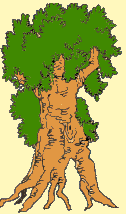Tamarindus indica;
Tamarindus indica
Common name: Tamarind, Tamarina
African names - Wolof: dakhar- Bambara: tombi, Ntomi, tumi- Peuhl: dam, dabé, dami, djammi- Hausa: tsamyia, tsamia-Goun and Fon from BENIN: Tomi
use
The fruit of the Tamarind tree is widely used in folk medicine as a laxative. The fruit removed from the epicarp and seeds is crushed and mixed with water or with a beverage made from milk and millet flour. The fruit pulp is also used as a febrifuge * but above all as a refreshing and soothing thirst.
Description
It is a tree 12 to 20 meters high that can live a very long time. The leaves are paripinnate. The flowers are yellowish. The fruits are thick, woody pods containing a pulp intermingled with fibers and sticking together 5 to 6 seeds. The root is very hard and is used as an aphrodisiac by macerating in SODABI alcohol.
Direction of use
Laxative
Maceration of the fruit in plain water (cold or hot) produces a refreshing, slightly tart drink that is very popular in West Africa. It is a mild laxative and a good cleanser.
Note: The leaves are diuretic and the roots are part of the composition of aphrodisiac herbal teas.
Add a comment























